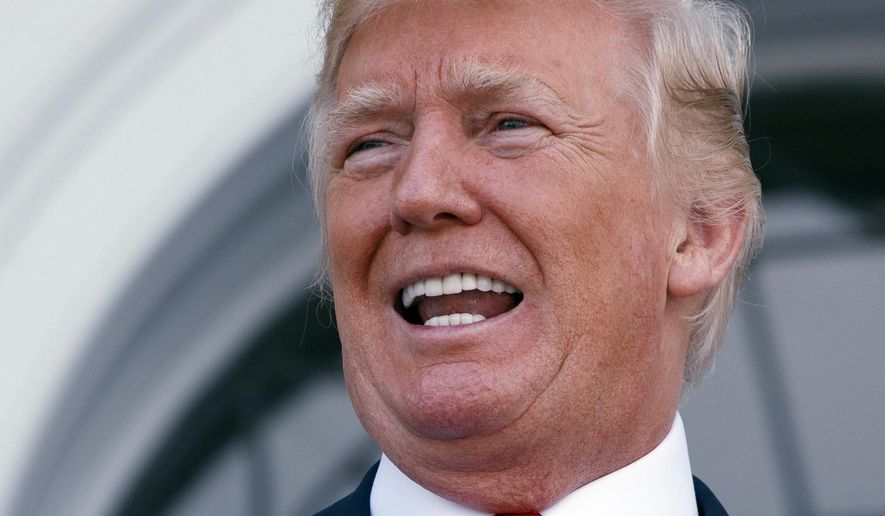OPINION:
Reaching the 200-day mark of his presidency, Donald Trump is getting resistance not just from the Democrats and their enablers in the liberal media, but from members of his own party who refuse to give the president a major legislative victory.
The seven Senate Republicans who refused to vote for a straight Obamacare repeal bill during the health care debate broke a promise to the American people while joining the resistance to their own president. Their defections completely stalled the health care reform process in Congress, even as insurance companies continue to exit the individual insurance markets in counties and states around the country.
Now comes the news that a number of GOP senators have been traveling to battleground states and testing the waters to run for president in 2020 against Mr. Trump. The New York Times even made the outrageous suggestion that Vice President Mike Pence was himself was preparing for a possible 2020 run against the man who selected him.
Ever the loyal lieutenant, Mr. Pence denounced the story as “disgraceful and offensive to me, my family, and our entire team. The allegations in this article are categorically false and represent just the latest attempt by the media to divide this administration.”
But these types of stories divide not just the administration but the Republican Party as a whole. Anyone who has worked in politics would know that it is normal for a vice president to be meeting with party donors, especially a man like Mr. Pence who has close connections to traditional GOP donors. The article clearly mischaracterized what Mr. Pence’s role and recent activities.
But the rumors reveal an underlying and unresolved problem for today’s GOP. Long after the election, some Republicans still refuse to accept that Mr. Trump’s win has fundamentally redefined the party. They are acting more like Democrats in refusing to help the president enact his agenda. I understand that there could be disagreements on issues such as trade, where many in the party has long favored open markets, but the bulk of the president’s agenda is rooted in solid, traditional Republican principles.
On issues such as economic deregulation, consumer-oriented health care, tax reform and school choice, you would think that these critical Republicans would have no trouble lining up behind the White House. Instead, these #NeverTrump Republicans — in line with the Democrats — continue to undermine the president.
This obstructionist stance does nothing to advance conservative principles. It’s the lesson I teach my daughters: Don’t stand there and criticize — roll up your sleeves and work to make things better. The Never Trumpers instead focus their energies on recruiting a 2020 unicorn candidate to oust the president. Take Bill Kristol, who mocked the president in a tweet: “Working at the beach. This is not a vacation — tweets and calls! (#NeverTrump never sleeps.).”
The conservative resistance to Mr. Trump, in its focus on a 2020 comeback, is jeopardizing Republican prospects in the 2018 midterm elections. They might even secretly be hoping that Republicans lose the House of Representatives so impeachment proceedings can begin. Like the Democrats, the Never Trumpers are have never accepted the 2016 election results and fervently dream of overturning the voters’ verdict through impeachment.
Recently I debated a member of the Never Trump camp who worked in Reagan administration. While she was highly critical of the Democrats, she was even more critical of Mr. Trump. She despised the president personally and would not acknowledge the accomplishments of this administration on issues ranging from judicial appointments to deregulation.
A divided party means losses in 2018 and in 2020. Though the RNC has been quite successful in fundraising this year, raising almost twice as much as the DNC, the divisions within the party and lack of legislative victories put many seats in the House in jeopardy. Republicans must retain their majority in 2018 if they want to continue advancing President Trump’s agenda, and money alone will not produce electoral wins in the midterms.
History has shown that challenging an incumbent president in the primary almost inevitably leads to defeat in the general election. In 1976, Gerald Ford lost to Jimmy Carter after Ronald Reagan challenged him in a bruising primary. Pat Buchanan’s challenge to George H.W. Bush in 1992 helped elect Democrat Jimmy Carter.
A top goal for any functioning political party is to work with its factions to avoid a damaging primary. Anyone familiar with recent presidential history knows that divisive primaries cost you the general election. If the Republican Party makes the same mistake again, we could see a President Bernard Sanders or another Democratic face in the White House in 2020.
Some in the GOP might never accept the president on a personal level, but it’s hard to argue against what Mr. Trump and his administration have been trying to achieve in his first 200 days.
• Mercedes Schlapp is a Fox News contributor, co-founder of Cove Strategies and former White House director of specialty media under President George W. Bush.




Please read our comment policy before commenting.